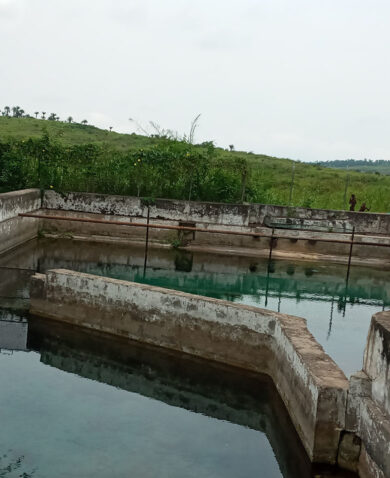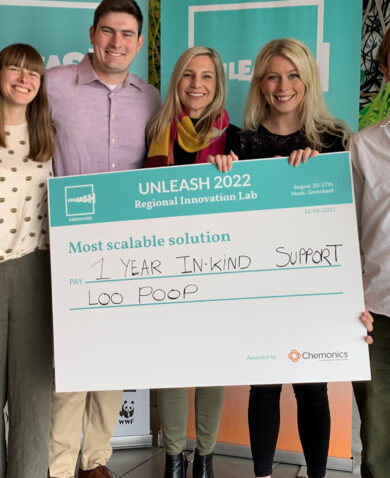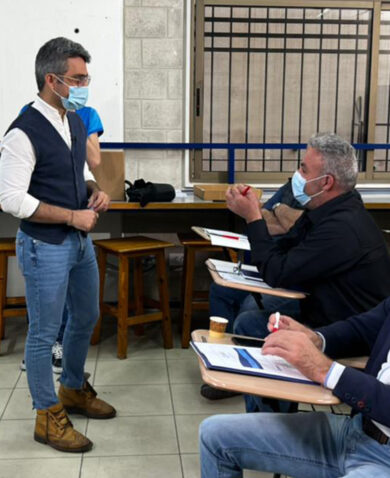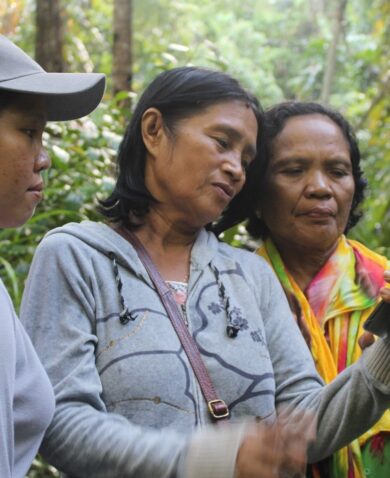
3 Questions with Dany Khy on Chemonics’ New Center for Private Sector Engagement
February 25, 2021 | 4 Minute ReadAs Chemonics launches its Center for Private Sector Engagement, its director Dany Khy shares our goals, approaches, and challenges for partnerships during the pandemic and beyond.
1. Why is Chemonics creating the Center for Private Sector Engagement? Why now and what are its goals?
Although the Center for Private Sector Engagement is new, Chemonics has worked with the private sector for over 40 years from empowering entrepreneurs and spurring the growth of local businesses to partnering with multinationals to deliver critical services. Chemonics has long believed that collaborating with the private sector is essential to achieving inclusive growth and sustainability. With recent trends in capital flows, the urgency of the COVID-19 pandemic, as well as the numerous challenges confronting our communities, private sector engagement is now — more than ever — critical to ensuring sustainable and resilient outcomes at scale. Many development professionals already know the statistics: the private sector creates nine out of 10 jobs in the developing world, serves as the driving force behind new innovations, and provides countries with a path toward self-reliance. The bottom line is that the private sector has the scale and resources to address the complexity of challenges that countries face. It’s for these reasons that Chemonics established a dedicated Center for Private Sector Engagement. Our objectives include ensuring that innovations in private sector engagement are incorporated into our company core business in two key areas: (1) facilitating high-impact partnerships with the private sector and (2) mobilizing capital — to deliver transformative and sustainable development outcomes at scale.
We applaud USAID for issuing the Private Sector Engagement Policy in December 2018 and recently establishing the Private Sector Engagement Hub and the U.K. Foreign Commonwealth and Development Office (FCDO) for its emphasis on mobilizing private capital to support the SDGs. The changes that donors seek are profound and require that all of us in the development community bring bold and effective market-based approaches to the table. We find that USAID’s principle to “engage early and often” is fundamental. We also believe that it’s important to be more deliberate when engaging with the private sector. In certain sectors or contexts, engaging with the private sector comes naturally. For frontier markets with a shallow private sector, this can be a challenge. One of the most important contributions that Chemonics’ new center can bring to the table in discussions with the private sector is our convening power in the countries where we work: our strong relationships with national and local governments, prominent local businesses, key organizations, and civil society. We can help facilitate linkages between various actors in a market system, provide targeted technical expertise, and leverage our on-the-ground networks. It is important that we’re intentional and consistent in our engagement to fully understand the private sector’s needs and the challenges and opportunities they face. This consultation process is critical to ensuring that we have a strong understanding of the issues. This helps all stakeholders better align our interests, ensure additionality, and maximize outcomes to create greater impact.
2. What do you see as the challenges and opportunities ahead for our work in private sector engagement?
Chemonics recognizes that no single organization alone can achieve development impact at scale, particularly now as we’re faced with enormous challenges including COVID-19, a global economic downturn, and a climate crisis. By strategically combining forces with corporations and local businesses, we can deliver better outcomes that can slow the spread of the pandemic, reduce our impact on the environment, help economies rebound, and equip local communities with the tools needed to tackle these challenges. Moreover, by making early investments in the economic systems and institutions in the countries we operate in, we can lay the groundwork necessary for economic recovery and long-term growth. We value the private sector’s unique expertise, access, and resources. They’re a critical partner in building back strong communities and resilient systems. We believe that collaboration with the private sector will be accelerated moving forward.
The challenges are indeed enormous, but now it is easier to approach the private sector than ever before since our goals and objectives are more closely aligned. We see businesses donating their time and resources for the public good. For example, our USAID E-PESO Activity in the Philippines brought together private sector partners to contribute to the development of an app that allowed Filipinos to safely and digitally access emergency relief funding. This is just one of many examples. We now have an opportunity to create stronger and more resilient systems that can better withstand shocks and crises. We hope that this increased collaboration between the public and private sectors will continue moving forward.
3. What do you want people to know about private sector engagement that doesn’t get a lot of attention by development practitioners?
One thing that many people don’t realize is that building meaningful and high-impact partnerships with the private sector is a long-term process. Frequently, it starts before a project actually begins — either at the proposal stage or even earlier. At Chemonics, we try to take a holistic approach to ensure the appropriateness and effectiveness of the partnership(s) in achieving development outcomes. We want to ensure that there is additionality and shared value. The amount of time and effort that is devoted to developing a meaningful and effective partnership does not often get addressed because it’s not appealing or sexy, yet it is critical to deepening each partner’s understanding of the other’s priorities and to ensure that we’re proposing the right solutions to address the development challenge. Further, partnerships are not always straightforward, particularly in new, risky sectors or challenging contexts that are underserved by the private sector, such as sustainable landscapes or gender lens investing. Given the diversity of emerging markets, it is critical to understand the local context — the level of sophistication and depth of the economy and financial market — and the appropriate role for letters of commitments, grants, performance-based contracts, debt, equity, and other innovative structures. Although lessons learned from other contexts are helpful, there’s no one-size-fits-all solution. With this in mind, it is important to examine the underlying issues of a development challenge, conduct appropriate market analyses, and propose solutions that are appropriate for the partnership, the project, and the country context. The USAID Colombia Rural Finance Initiative is one example and USAID’s Invest Activity in the Democratic Republic of Congo is another. This takes time. In the end, the results are clear: a more effective partnership that is driven by local stakeholders to ensure sustainable impact.
Posts on the blog represent the views of the authors and do not necessarily represent the views of Chemonics.





































